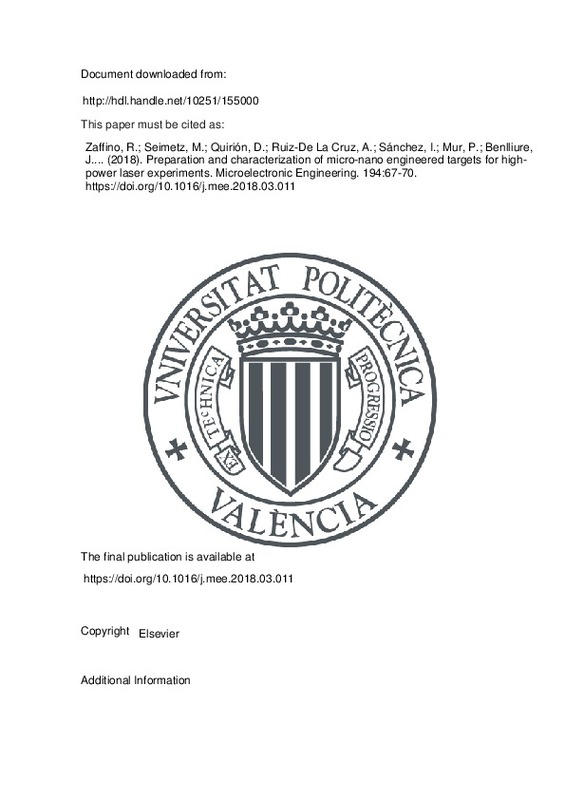Zaffino, R.; Seimetz, M.; Quirión, D.; Ruiz-De La Cruz, A.; Sánchez, I.; Mur, P.; Benlliure, J.... (2018). Preparation and characterization of micro-nano engineered targets for high-power laser experiments. Microelectronic Engineering. 194:67-70. https://doi.org/10.1016/j.mee.2018.03.011
Por favor, use este identificador para citar o enlazar este ítem: http://hdl.handle.net/10251/155000
|
Título:
|
Preparation and characterization of micro-nano engineered targets for high-power laser experiments
|
|
Autor:
|
Zaffino, R.
 Seimetz, Michael
Quirión, D.
Ruiz-de la Cruz, A.
Sánchez, I.
Mur, P.
Benlliure, J.
Martín, L.
Roso, Luis
Seimetz, Michael
Quirión, D.
Ruiz-de la Cruz, A.
Sánchez, I.
Mur, P.
Benlliure, J.
Martín, L.
Roso, Luis

 Benlloch Baviera, Jose María
Lozano, M.
Pellegrini, G.
Benlloch Baviera, Jose María
Lozano, M.
Pellegrini, G.
|
|
Entidad UPV:
|
Universitat Politècnica de València. Instituto Universitario Mixto de Biología Molecular y Celular de Plantas - Institut Universitari Mixt de Biologia Molecular i Cel·lular de Plantes
Universitat Politècnica de València. Instituto de Instrumentación para Imagen Molecular - Institut d'Instrumentació per a Imatge Molecular
|
|
Fecha difusión:
|
|
|
Resumen:
|
[EN] The continuous development of ultra-fast high-power lasers (HPL) technology with the ability of working at unprecedented repetition rates, between 1 and 10 Hz, is raising the target needs for experiments in the different ...[+]
[EN] The continuous development of ultra-fast high-power lasers (HPL) technology with the ability of working at unprecedented repetition rates, between 1 and 10 Hz, is raising the target needs for experiments in the different areas of interest to the HPL community. Many target designs can be conceived according to specific scientific issues, however to guarantee manufacturing abilities that enable large number production and still allow for versatility in the design is the main barrier in the exploitation of these high repetition rate facilities. Here, we have applied MEMS based manufacturing processes for this purpose. In particular, we have focused on the fabrication and characterization of submicrometric conductive membranes embedded in a silicon frame. These kinds of solid targets are used for laser-driven particle acceleration through the so-called Target Normal Sheath Acceleration mechanism (TNSA). They were obtained by top-down fabrication alternating pattern transfer, atomic layer deposition, and selective material etching. The adaptability of the approach is then analyzed and discussed by evaluating different properties of targets for use in laser-driven particle acceleration experiments. These characteristics include the surface properties of membranes after fabrication and the high density of the target array. Finally, we were able to show their efficiency for laser-driven proton acceleration in a series of experiments with a 3 TW table-top laser facility, achieving stable proton acceleration up to 2 MeV.
[-]
|
|
Palabras clave:
|
Ultra-thin membrane
,
Solid target
,
HPL
,
TNSA
,
Laser-driven proton acceleration
|
|
Derechos de uso:
|
Reconocimiento - No comercial - Sin obra derivada (by-nc-nd)
|
|
Fuente:
|
Microelectronic Engineering. (issn:
0167-9317
)
|
|
DOI:
|
10.1016/j.mee.2018.03.011
|
|
Editorial:
|
Elsevier
|
|
Versión del editor:
|
https://doi.org/10.1016/j.mee.2018.03.011
|
|
Código del Proyecto:
|
info:eu-repo/grantAgreement/MINECO//RTC-2015-3278-1/
|
|
Agradecimientos:
|
The authors highly appreciate the collaboration of Radosys (Budapest) which provided CR-39 detector material, etching bath, and readout equipment. This project has been financed by the Spanish Ministry for Economy and ...[+]
The authors highly appreciate the collaboration of Radosys (Budapest) which provided CR-39 detector material, etching bath, and readout equipment. This project has been financed by the Spanish Ministry for Economy and Competitiveness within the Retos-Colaboracion 2015 initiative, ref. RTC-2015-3278-1. P. Mur has received a grant of the Garantia Juvenil 2015 program. This work has made use of the Spanish ICTS Network MICRONANOFABS partially supported by MEINCOM.
[-]
|
|
Tipo:
|
Artículo
|







![[Cerrado]](/themes/UPV/images/candado.png)


